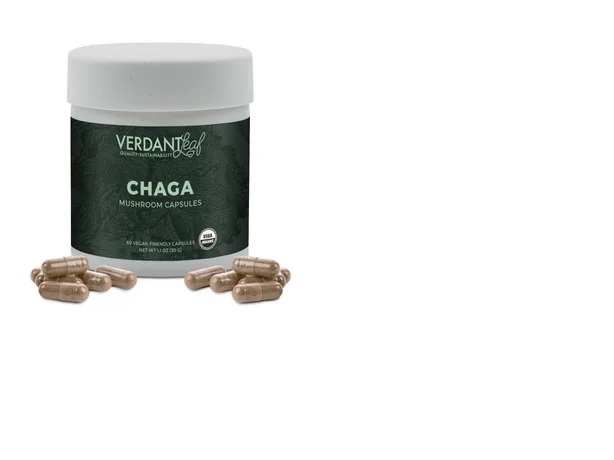Chaga mushroom, scientifically known as Inonotus obliquus, is a type of fungus that grows primarily on birch trees in cold climates such as Siberia, Russia, Canada, and parts of the United States. Revered for its medicinal properties in traditional Siberian and Russian folk medicine for centuries, chaga has gained global recognition in recent years as a potent natural remedy with numerous potential health benefits. In this comprehensive guide, we’ll explore the origins, nutritional composition, therapeutic applications, dosage recommendations, and safety considerations associated with chaga mushroom supplements.
Understanding Chaga Mushroom
Origins and Traditional Use
Chaga mushroom has a rich history of use in traditional medicine systems, particularly in Siberia and Russia, where it has been valued for its purported health-enhancing properties for centuries. Known as the “King of Mushrooms” or the “Mushroom of Immortality,” chaga has been used traditionally to support immune function, promote longevity, and treat various ailments, including gastrointestinal issues, respiratory conditions, and inflammatory disorders.
Nutritional Composition
Chaga mushroom is prized for its rich nutritional profile, containing an array of bioactive compounds that contribute to its medicinal properties. These include polysaccharides (such as beta-glucans), polyphenols (such as flavonoids and phenolic acids), triterpenes (such as betulinic acid), and melanin pigments. Chaga is also a rich source of essential nutrients, including vitamins (such as vitamin D and B-complex vitamins), minerals (such as potassium, calcium, iron, and zinc), and amino acids.
Health Benefits of Chaga Mushroom Supplements
Immune Support
One of the most well-known benefits of chaga mushroom supplements is their ability to support immune function. Chaga contains beta-glucans and other polysaccharides that stimulate the activity of immune cells, such as macrophages, natural killer (NK) cells, and T lymphocytes. By enhancing the body’s natural defense mechanisms, chaga mushroom supplements may help protect against infections, viruses, and other pathogens.
Anti-Inflammatory Effects
Chaga mushroom exhibits potent anti-inflammatory properties, which can help reduce inflammation and alleviate symptoms associated with inflammatory conditions such as arthritis, asthma, and inflammatory bowel disease (IBD). The triterpenes and polyphenols found in chaga inhibit pro-inflammatory cytokines and enzymes, thereby modulating the inflammatory response and promoting tissue repair.
Antioxidant Protection
Chaga mushroom is rich in antioxidants, including polyphenols and melanin pigments, which help neutralize harmful free radicals and protect cells from oxidative damage. Antioxidants play a crucial role in reducing the risk of chronic diseases, including cancer, heart disease, and neurodegenerative disorders. Regular supplementation with chaga mushroom may help support cellular health and slow the aging process.
Adaptogenic Properties
Chaga mushroom exhibits adaptogenic properties, meaning it helps the body adapt to stress and maintain homeostasis. Adaptogens like chaga help regulate the hypothalamic-pituitary-adrenal (HPA) axis and modulate the release of stress hormones such as cortisol. By promoting a state of balance and resilience, chaga mushroom supplements may help improve stress tolerance, enhance mental clarity, and reduce fatigue.
Antimicrobial Activity
Chaga mushroom possesses broad-spectrum antimicrobial properties, which can help inhibit the growth of bacteria, viruses, and fungi. The polysaccharides and polyphenols in chaga have been shown to exhibit antimicrobial effects against various pathogens, including Staphylococcus aureus, Escherichia coli, Candida albicans, and influenza viruses. Chaga supplements may be used to support immune health and prevent infections.
Dosage Recommendations
Extracts and Powders
Chaga mushroom supplements are available in various forms, including extracts, powders, capsules, and teas. Dosage recommendations may vary depending on the concentration of active compounds and the specific health goals of the individual. However, a typical dosage range for chaga extract is 500-2000 milligrams per day. It is advisable to follow the dosage instructions provided on the product label or consult with a healthcare professional for personalized recommendations.
Safety Considerations
Generally Recognized as Safe
Chaga mushroom supplements are generally considered safe for most individuals when taken at recommended doses. However, some people may experience mild side effects, including gastrointestinal upset or allergic reactions. It is essential to start with a low dose and monitor for any adverse reactions. Pregnant or breastfeeding women should consult with a healthcare professional before using chaga supplements.
Potential Interactions
Chaga mushroom supplements may interact with certain medications or medical conditions. Individuals taking medications for diabetes, blood pressure, or blood thinning should exercise caution and consult with a healthcare professional before using chaga supplements. Additionally, individuals with known allergies to mushrooms or birch pollen should avoid chaga supplements or use them under medical supervision.
Conclusion
Chaga mushroom supplements offer a plethora of potential health benefits, including immune support, anti-inflammatory effects, antioxidant protection, adaptogenic properties, and antimicrobial activity. With its rich nutritional composition and centuries-old history of traditional use, chaga continues to be valued as a powerful natural remedy for promoting overall health and well-being. By incorporating chaga mushroom supplements into a balanced lifestyle, individuals can harness the medicinal properties of this remarkable fungus to support optimal health for years to come. As always, it’s essential to consult with a healthcare professional before starting any new supplement regimen.
- Benefits of Chuchuhuasi Supplements - March 30, 2024
- Benefits of Chinese Figwort Supplements - March 30, 2024
- Benefits of Chickweed Supplements - March 21, 2024

